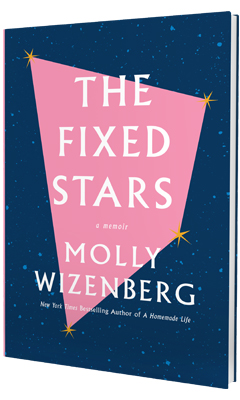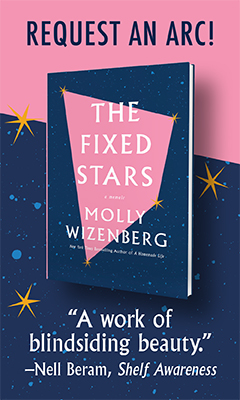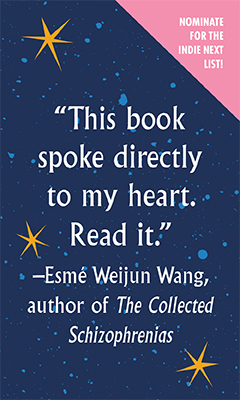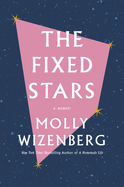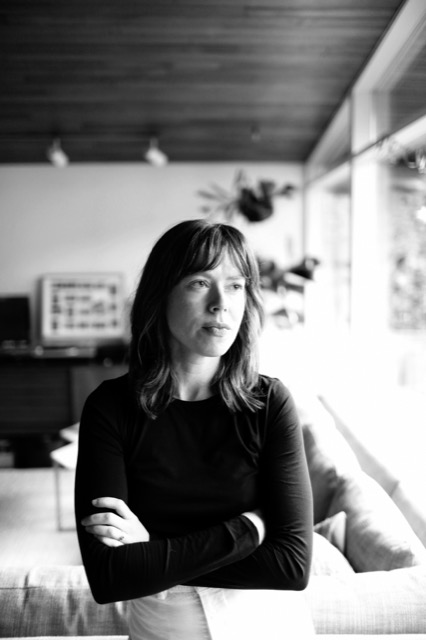The Fixed Stars
by Molly Wizenberg
In another writer's hands, this could have been awkward. Molly Wizenberg's previous bestselling memoirs--A Homemade Life: Stories and Recipes from My Kitchen Table and Delancey: A Man, a Woman, a Restaurant, a Marriage--are to a large extent valentines to Brandon Pettit, with whom she opened Delancey, a beloved Seattle restaurant. Wizenberg's blindsidingly beautiful new memoir, The Fixed Stars, is about how she initiated a divorce from Pettit after an incapacitating crush on a woman compelled her to rethink her marriage and sexuality. She also gives her morality some squinty-eyed accounting. "Are you allowed," she wonders, "to grieve if you've caused the death?"
To explain how she arrived at this brutal reckoning, Wizenberg begins with her youth. Born in 1978, she grew up a privileged only child in Oklahoma City; her lifetime aversion to feather ruffling ("I came out of the womb eager to please") is a big part of what will make her decision to end her marriage so shocking to Wizenberg's fans, who have come to know her rule-observant personality. She seems a little shocked herself.
Wizenberg always considered herself straight: "I liked boys," she writes in The Fixed Stars. "That was who I was." At 20, she lost her virginity to a man. A year or so later, a woman she was working with at Whole Foods seemed to be trying to woo her: "This was the same time period when I had my 'lesbian' haircut, and it was probably because of that haircut that Laura invited me to a party." A couple of weeks later, Laura asked her out on what sure seemed like a date, during which Wizenberg played her hand: she told Laura that this was the first time she had ever found herself attracted to a woman. Laura "must have said something in response.... She must have told me she couldn't, or she wouldn't. She didn't touch me. Nothing happened. I went home."
Down the heterosexual romantic path Wizenberg proceeded. She met Pettit in 2005, after they enjoyed an e-mail exchange that he had initiated: he was an admirer of her celebrated (and now dormant) food blog, Orangette. Pettit moved from New York to Seattle, where Wizenberg was based; they got married, opened Delancey in 2009, and had a baby in 2012. Wizenberg was 36 and being something of a homebody, taking care of her child, doing bookkeeping for Delancey, and foraging for time to write, when she received a jury duty summons that proved more existentially consequential than most.
Wizenberg found herself smitten with Nora, the trial's female defense attorney, of whom she takes stock from the jury box: "I knew only that she was a woman in a suit. But I think she looked like something more than that, something I didn't have: the will to stand apart, to crumple up the script." This isn't the first time the eager-to-pleaser takes pleasure in dashed expectations. As Wizenberg recalls when recounting her 15-years-earlier fizzle with Laura, "I told her what I wanted. I became someone who surprised me, someone interesting." Another time she surprises herself: Wizenberg e-mails Nora many months after the trial is over, having been unable to stop thinking about her.
The problem with being "someone interesting," as Wizenberg interprets the phrase, is that things tend to go less smoothly for such people. This is a trade-off that she is willing to make to follow her heart, but not without tearily registering the collateral damage suffered by her young daughter and by Pettit. Wizenberg is also bracingly candid about the ways that her marriage had been unfulfilling, although sex seems to have had nothing to do with it. For all the wonderful particularity of Wizenberg's story--from the Seattle-restaurant-scene backdrop to her calibrated foray into open marriage--The Fixed Stars is essentially a timeless tale: someone finds herself drifting from her spouse and decides to stray.
This is not to say that the gender of Wizenberg's crush object is beside the point, and she writes with grace, acuity and punch about her efforts to untangle her sexuality, and to untangle it further when things with Nora become untenable. She no longer sees things as simply as she did as a precocious eighth grader who, in an attempt to shore up compassion for gay people (including a cherished uncle who died of AIDS), selected homosexuality as the topic of a research paper. In it, she argued for the "born this way" theory of sexual orientation.
The adult Wizenberg understands the allure of such fixed ideas: "Astronomers know that every star is in motion, and that each moves along its own trajectory, according to its own properties. The constellations we see are temporary human creations, our effort to draw order and meaning from a mostly unknowable universe, to tell ourselves stories, to guide our way home across endless oceans." A Homemade Life and Delancey are marvelous guides, complete with recipes, for living a food-centered life; The Fixed Stars is a guide (of sorts) for a more improvised life, in which recipes are jettisoned and which, Wizenberg is finding, better suits her tastes. --Nell Beram



